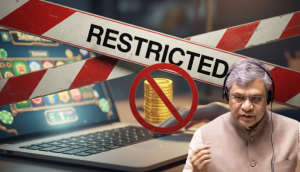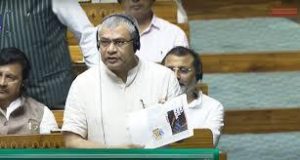New Delhi – The landmark Online Gaming Bill 2025 Becomes Law after receiving President Droupadi Murmu’s assent on Friday, marking a watershed moment in India’s digital entertainment landscape. This comprehensive legislation, which prohibits all online money gaming services, represents one of the most significant regulatory interventions in the country’s rapidly growing gaming sector.
Presidential Assent Finalizes Gaming Prohibition

The Online Gaming Bill 2025 Becomes Law just one day after the Rajya Sabha cleared the controversial legislation, demonstrating the government’s urgency in addressing what it considers a social menace. President Murmu’s approval transforms the Promotion and Regulation of Online Gaming Bill into enforceable law, immediately impacting millions of players and thousands of businesses across the country.
The swift progression of the Online Gaming Bill 2025 Becomes Law through both houses of Parliament underscores the administration’s determination to eliminate online money gaming from India’s digital ecosystem, despite significant opposition from industry stakeholders and procedural concerns raised by parliamentary opposition.
Harsh Penalties and Enforcement Mechanisms


Now that the Online Gaming Bill 2025 Becomes Law, it establishes severe penalties for violations. Facilitators of online money gaming services face imprisonment of up to three years and fines reaching ₹1 crore. The legislation also targets advertising and promotion activities, imposing sentences of up to two years and fines of ₹50 lakh for those marketing prohibited gaming platforms.
The stringent enforcement provisions in the Online Gaming Bill 2025 Becomes Law reflect the government’s commitment to completely eliminating money-based online gaming rather than merely regulating it. These penalties are designed to deter not only operators but also advertisers, influencers, and other stakeholders who might promote such platforms.
Parliamentary Passage and Political Support


The Online Gaming Bill 2025 Becomes Law after remarkably swift parliamentary approval, with the Rajya Sabha passing it in just 26 minutes and the Lok Sabha clearing it in seven minutes. This unprecedented speed of passage, despite opposition protests over procedural concerns, demonstrates the broad political consensus supporting the gaming ban.
Union Minister for Electronics and Information Technology Ashwini Vaishnaw defended the legislation during parliamentary debates, emphasizing that the Online Gaming Bill 2025 Becomes Law addresses a critical social issue. He told MPs that people were losing their life savings to online money gaming platforms, necessitating immediate legislative intervention.
Government’s Social Protection Rationale


Minister Vaishnaw justified why the Online Gaming Bill 2025 Becomes Law by citing the government’s responsibility to combat social evils. He stated, “From time to time, society grapples with social evils. In these circumstances, it is the duty of the government and the parliament to probe and make laws to control them.”
The minister presented alarming statistics supporting the Online Gaming Bill 2025 Becomes Law, revealing that government estimates show 450 million players have lost over ₹20,000 crore to online money gaming platforms. These figures provided crucial justification for the comprehensive prohibition rather than regulatory oversight.
Prime Minister’s Vision for Gaming Industry
Prime Minister Narendra Modi welcomed the Online Gaming Bill 2025 Becomes Law, articulating a vision that distinguishes between harmful money gaming and beneficial digital entertainment. He emphasized that the legislation would encourage e-sports and online social games while protecting society from money gaming’s harmful effects.
Modi’s statement supporting the Online Gaming Bill 2025 Becomes Law highlighted the government’s commitment to making India a hub for gaming, innovation, and creativity. This dual approach aims to eliminate financial gambling while promoting skill-based gaming and competitive e-sports development.
Industry Devastation and Economic Impact
Industry representatives have condemned the Online Gaming Bill 2025 Becomes Law as a “death knell” for legitimate businesses operating in the ₹31,000 crore sector. They argue that the blanket prohibition will benefit offshore operators while devastating compliant domestic companies that have invested heavily in Indian operations.
The Online Gaming Bill 2025 Becomes Law threatens over 200,000 jobs in the gaming sector, according to industry estimates. The sector has attracted ₹25,000 crore in foreign investment since 2022, making the economic implications of this legislation particularly significant for India’s digital economy aspirations.
Platform Shutdowns and Market Response


Following the Online Gaming Bill 2025 Becomes Law, major gaming platforms have announced immediate cessation of operations. Industry leaders including Dream11 and WinZO have declared they will shut down their services rather than face criminal prosecution under the new regulations.
These shutdowns represent the immediate practical impact of the Online Gaming Bill 2025 Becomes Law, transforming what was once a thriving digital entertainment sector into a legally prohibited activity. The rapid platform closures demonstrate the legislation’s effectiveness in achieving its prohibition objectives.
Future Implications for Digital Entertainment
The Online Gaming Bill 2025 Becomes Law establishes important precedents for government intervention in digital entertainment sectors. While promoting e-sports and skill-based games, the legislation creates clear boundaries between acceptable and prohibited online activities.
The long-term success of the Online Gaming Bill 2025 Becomes Law will depend on effective enforcement mechanisms and the government’s ability to foster legitimate gaming alternatives while preventing the emergence of underground money gaming networks. This landmark legislation marks a definitive moment in India’s approach to digital gaming regulation, prioritizing social protection over market freedoms.

